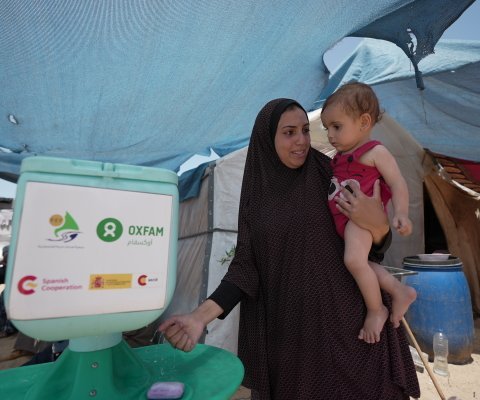What is the difference between sex and gender? Between the practical needs of women and girls after a disaster, and their strategic needs? What are gender-blind, gender-sensitive, and gender-transformative interventions?
These are not questions to be asking yourself in the midst of an emergency, yet everyone involved in emergency response should know the answers.
In June of 2006, researcher Chaman Pincha set out to learn about how well women's needs were met in India after the tsunami, and to document the most successful work of several local NGOs. What she learned is that, while many international NGOs had issued guidelines about promoting the well-being and advancement of women and girls, in the midst of a major emergency their staff and partners didn't necessarily have the training or commitment needed to make the goals reality.
"Local NGOs working in partnership with international NGOs can prove to be either the strongest or the weakest links in delivering gender-sensitive programs," says Pincha. "Those with a high awareness and commitment to gender equity can translate abstract ideals into effective and culturally appropriate programming on the ground, while those that have never successfully challenged the biases within their organizations or communities might deliver programs in a way that perpetuates inequities."
That realization suggested Pincha's next step: develop a toolkit—translated into local languages—to help NGOs of all stripes focus on the issue of gender equality and the needs and opportunities that present themselves at times of emergency. The document that emerged introduces concepts related to gender; the different ways that the tsunami disaster affected women, men, and marginalized groups; ways of determining the practical and strategic needs of women and other marginalized groups in disaster situations; case studies about programs that worked well after the tsunami; and recommendations for making future programs more thoughtful and fair.
Kasthura Chandrasekar, the leader of a women's federation of self-help groups, was introduced to the Tamil Nadu version of the toolkit in May at a workshop for local NGOs in Nanadavanam. "The idea of practical gender needs is very important. It hits us like anything," she says. She explains that she wouldn't get much out of a longer document because she is semi-literate, but, she says, "the toolkit is very simple and crisp."
The two-day workshop on the toolkit that she attended involved discussions, role-playing, and lively games for 22 NGO leaders, designed to bring to light the ways that gender stereotyping and discrimination are social constructs, not decreed by nature and not to anyone's real advantage.
"Unless gender sensitivity is internalized, it won't be consistently applied," says Pincha. "If you are consistently aware of the gender issues in any context, then your spontaneous response to disaster will be sensitive."
As the workshop drew to a close, the participants wrote down on slips of paper the things they wanted to hold onto from their two days together, and some old notions they'd like to throw away—a collection of wishes and vows that shows internalization of Pincha's messages was swift and deep.
"In my life, I will not differentiate between men and women; I will take up gender in all my work."
"I had an expectation that men should behave in a certain way. I am throwing this notion away."
"I used to think about Aravanis [transgendered people] in society as disgusting. I'm throwing away my ignorance here."
"My wife, my daughter, my female relatives—I used to dominate. I'm throwing it out."
"There is nothing that cannot be changed. It is possible to change. I take an oath to bring about gender justice in me, in my family, and then out in the world."



